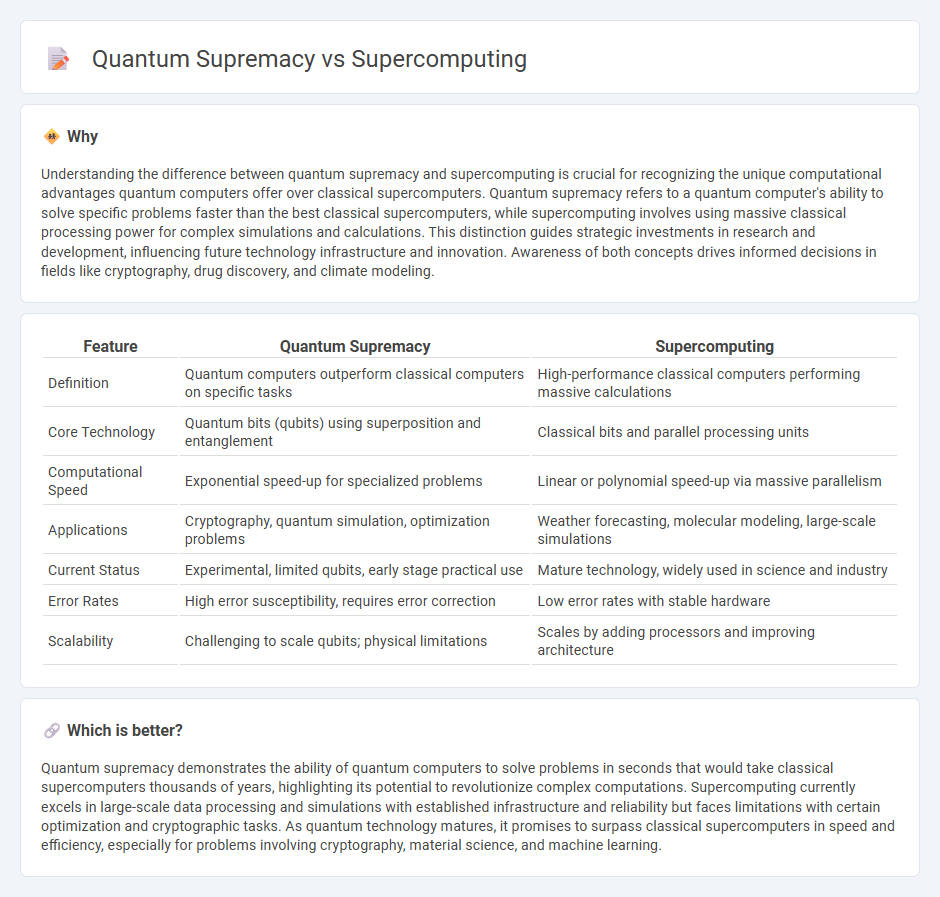
Quantum supremacy represents a breakthrough where quantum computers solve problems beyond the capabilities of the most powerful classical supercomputers, leveraging phenomena like superposition and entanglement. Supercomputing relies on massively parallel processing and high-speed interconnections to tackle complex simulations and data analysis tasks still out of reach for quantum machines at scale. Explore further to understand how these contrasting technologies are reshaping computation and future innovation.
Why it is important
Understanding the difference between quantum supremacy and supercomputing is crucial for recognizing the unique computational advantages quantum computers offer over classical supercomputers. Quantum supremacy refers to a quantum computer's ability to solve specific problems faster than the best classical supercomputers, while supercomputing involves using massive classical processing power for complex simulations and calculations. This distinction guides strategic investments in research and development, influencing future technology infrastructure and innovation. Awareness of both concepts drives informed decisions in fields like cryptography, drug discovery, and climate modeling.
Comparison Table
| Feature | Quantum Supremacy | Supercomputing |
|---|---|---|
| Definition | Quantum computers outperform classical computers on specific tasks | High-performance classical computers performing massive calculations |
| Core Technology | Quantum bits (qubits) using superposition and entanglement | Classical bits and parallel processing units |
| Computational Speed | Exponential speed-up for specialized problems | Linear or polynomial speed-up via massive parallelism |
| Applications | Cryptography, quantum simulation, optimization problems | Weather forecasting, molecular modeling, large-scale simulations |
| Current Status | Experimental, limited qubits, early stage practical use | Mature technology, widely used in science and industry |
| Error Rates | High error susceptibility, requires error correction | Low error rates with stable hardware |
| Scalability | Challenging to scale qubits; physical limitations | Scales by adding processors and improving architecture |
Which is better?
Quantum supremacy demonstrates the ability of quantum computers to solve problems in seconds that would take classical supercomputers thousands of years, highlighting its potential to revolutionize complex computations. Supercomputing currently excels in large-scale data processing and simulations with established infrastructure and reliability but faces limitations with certain optimization and cryptographic tasks. As quantum technology matures, it promises to surpass classical supercomputers in speed and efficiency, especially for problems involving cryptography, material science, and machine learning.
Connection
Quantum supremacy represents a pivotal milestone where quantum computers outperform classical supercomputers in specific tasks, demonstrating their superior processing capabilities. Supercomputing involves harnessing immense computational power through parallel processing, whereas quantum supremacy leverages quantum bits (qubits) for exponentially faster problem-solving in areas such as cryptography and complex simulations. The connection between quantum supremacy and supercomputing lies in their shared goal of pushing computational boundaries, with quantum supremacy challenging traditional supercomputing by offering novel algorithms that can solve previously intractable problems more efficiently.
Key Terms
Processing Power
Supercomputing leverages massive parallelism with thousands of CPUs and GPUs to achieve petaflop-scale processing power, excelling in complex simulations and data analysis. Quantum supremacy refers to quantum computers solving specific problems exponentially faster than the most powerful classical supercomputers, utilizing qubits and quantum entanglement. Explore the latest breakthroughs to understand how these technologies redefine the future of computational power.
Qubits
Quantum supremacy is achieved when a quantum computer, using qubits, performs tasks infeasible for classical supercomputers, which rely on traditional bits for processing. Qubits enable quantum states like superposition and entanglement, exponentially increasing computational power compared to binary bit operations in supercomputing. Explore the intricacies of qubits and their pivotal role in quantum supremacy to understand the future of computing.
Parallelism
Supercomputing leverages massive parallelism through thousands of CPU cores and GPUs to perform complex calculations simultaneously, optimizing tasks like climate modeling and cryptography. Quantum supremacy harnesses qubits' entanglement and superposition to execute specific computations exponentially faster than classical parallel systems, particularly in factoring and optimization problems. Explore the distinct mechanisms of parallelism in supercomputing and quantum supremacy to understand their transformative impacts on computational science.
Source and External Links
What Is Supercomputing? - IBM - Supercomputing involves using powerful computers, known as supercomputers, to perform complex calculations and solve problems in fields like AI and data analysis.
Science 101: Supercomputing - Argonne National Laboratory - Supercomputers are used to simulate experiments that are too costly or dangerous to conduct in real life, such as understanding how stars explode or modeling weather patterns.
What is Supercomputing? - HPE - Supercomputing efficiently solves complex problems by concentrating the processing power of multiple parallel computers, often used in fields like weather forecasting and life sciences.
 dowidth.com
dowidth.com